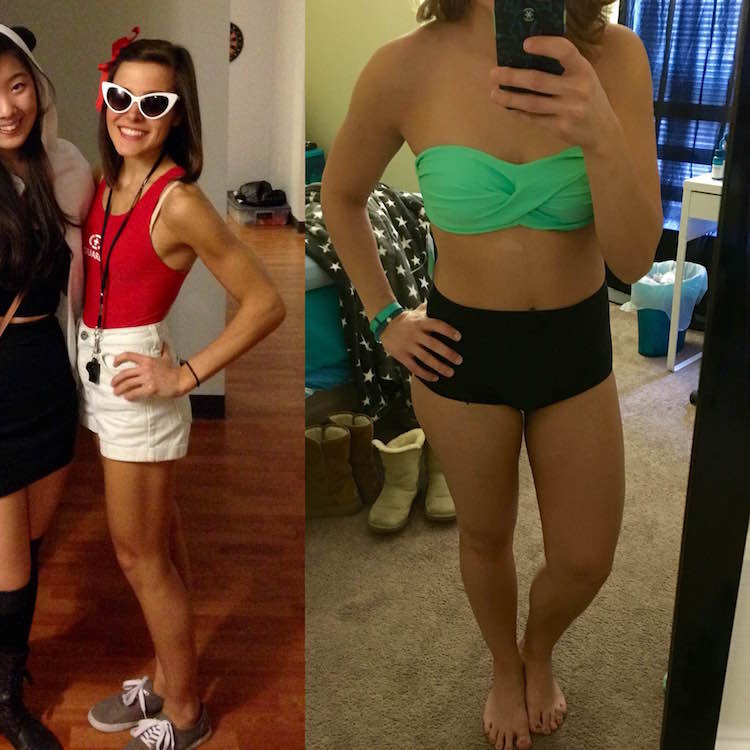It took me many months to talk about my struggle with orthorexia and other eating disorder-related issues. The National Eating Disorder Association defines orthorexia nervosa as a fixation on eating only the healthiest foods and the right portions. These people want to be better than others with their diets, and they punish themselves for slipping up, either by fasting or through excessive exercise. They gradually restrict their diets so much so that their health begins to suffer.
Orthorexia is not currently considered a clinical diagnosis as an eating disorder, although its control can be so extreme that those who exhibit its symptoms can have both physical and mental consequences.

Photo by Olivia D’Aiutolo.
When I went from 135 pounds to 95 pounds in a matter of 4 months during my freshman year of college, I did not only exhibit symptoms of orthorexia. But when my doctor described the symptoms to me when I came home that summer, I was perplexed. I didn’t think I had anorexia, because I never fully stopped eating. I didn’t think I had bulimia, because I didn’t purge regularly—only sometimes. That summer, and since then, my understanding and defining of eating disorders evolved significantly.
I gained the Freshman 15 in my first semester of college. Then I decided to change my lifestyle; I would go to the gym, eat healthy, and lose 20 pounds. I reached my goal in a month and a half by going to the gym 6 days a week and eating about 700 calories per day. It became an addiction. When I reached my goal, I figured I’d lose a little extra before my study abroad in Italy so that I would have some room to gain while there. A little extra turned into 15 pounds, then 20, and so on.

Photo by Olivia D’Aiutolo.
Even after countless doctors’ appointments and regular blood tests, I still just shook my head at everyone when they told me this was not right.
I skipped social outings, refused to go out to dinner, anything to ensure I could eat healthy and go to the gym. It took me a little more than a full year to start gaining weight, which was an extremely painful process.
My now-fiancé and family helped me accept what needed to happen to my body. But my weight was still in the back of my mind, and I still attempted to diet and exercise myself into submission. Perhaps a blessing because I couldn’t fall back into unhealthy habits and also a curse because it is very painful, I found out I had hip dysplasia. I experienced other physical symptoms of my disorder, like fatigue and thinning hair, but the pain that the labrum tears were giving me pushed me to my limit. During months of physical therapy being the only safe exercise I could do, I inevitably gained more weight.
I reached the equilibrium that I had been told by my doctor and my psychologist I would eventually reach, and it was only then that I started to realize what happened to me and that I started talking about it. I had to start loving myself if I didn’t want to be miserable anymore.
I realized my equilibrium when I tried dieting and simply could not live off of such a low amount of calories. I realized it when I was eating less and healthier but still did not lose any weight. I realized my healthy weight is the one that comes naturally to me while living a healthy and active lifestyle. Maintaining your weight should not be so difficult that you are constantly anxious and overly tired. And healthy looks different on everyone.

Photo by Olivia D’Aiutolo.
I eventually came to define eating disorders as any negative feeling associated with eating. I expressed symptoms of every single type of classified eating disorder and the unclassified orthorexia.
Orthorexia is dangerous because many do not see it as being as serious as anorexia or bulimia. It can easily turn into one of the two, or both.
I went from tons of selfies where I now see that my hollowed-out cheeks are not healthy, to no selfies when I started gaining weight last year, to now tons of selfies because I am finally comfortable in my own skin. The guilty and anxious feelings will always be there, but having a more encompassing definition of eating disorders and what is and isn’t healthy has completely changed my relationship with both food and my body. Disordered eating goes beyond prescribed diagnoses. I would not be writing for Spoon today had I not started the recovery process and changed my relationship with food entirely.
I share because it has been an important part of my recovery, and it showed me I am not alone. Acknowledging the problem as a problem and presenting my progress has helped me realize that I am going in the right direction, that I am normal and capable of displaying great strength, that I can conquer something that many people didn’t get a chance to. Therefore, I should try to help as many people as possible so they can conquer it, too.

Photo by Olivia D’Aiutolo.


